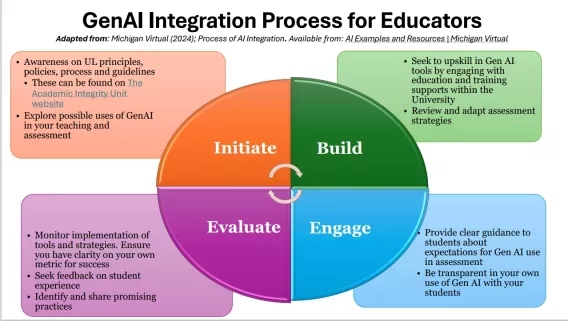
Gen AI and Assessment
NAIN have published a Generative AI Guidelines for Educators (2023) which provides high level guidance for institutions, educators and students. Information presented on this webpage incorporates the guidance provided by NAIN as well as guidance from European and international institutions. The Gen AI Dos and Don'ts for Staff clip above provides a short summary of the NAIN Guidance as interpreted by the UL Academic Integrity Unit.
Artificial intelligence presents many opportunities and challenges to Higher Education Institutions (HEIs) particularly in relation to teaching, learning and assessment. The University of Limerick Interim Statement on Academic Integrity and Academic Misconduct (March 2024) offered broad guidance to educators on the management of Gen AI as it relates to assessment.
Building on this statement, the Academic Integrity Unit have identified a framework that might be of assistance to academics (Perkins et al. 2024). Please note that an updated version of the AI Assessment Framework is available.
Such frameworks are widely used within UK and some Irish HEIs. They can be helpful for educators as they support clear communication to students as to what is acceptable in the context of assessment.
The Gen AI and Assessment clip, which provides a broad summary of the framework, available here.
Academic staff should consider whether assessment rubrics need to be reviewed to ensure that marks are not being awarded for work that the Gen AI tool is completing e.g. grammar and punctuation.
Can you provide me a detailed overview of the GenAI and Assessment Framework?
Yes. Please see here the full framework which includes case studies. The case studies have been developed by the Academic Integrity Unit to enhance understanding and are deliberately generic in nature to be of assistance to a variety of disciplines.
How should I use this framework in my assessments?
You may choose to reflect on the assessment(s) that are currently used within your module(s). You can identify the level of Gen AI involvement that is permitted within the assessment. This can be communicated to students within guidance offered to students on assessment, within module handbooks or during teaching sessions.
Alternatively, you might decide that assessment needs to be redesigned to uphold academic integrity.
How is this framework useful?
Integrating this framework into the assessment guidance you offer to students has the following advantages:
· Students have a clear understanding as to the acceptable use of Gen AI for an assessment.
· The framework acknowledges that Gen AI can be used to different degrees in the completion of an assessment and captures these various degrees of use.
· A single framework used across the University of Limerick ensures that students receive consistent guidance on the use of Gen AI within their assessments.
· Breaches of the assessment regulations outlined by the module lead or programme director can clearly be communicated to students in the context of this framework.
Can I adapt this framework for my Module/Programme/Department?
It is recommended that the framework is used as presented to ensure consistency amongst those who choose to adapt it into their assessment.
We welcome feedback on the framework and will seek to integrate this feedback to meet the needs of all educators. You can contact the Academic Integrity Unit by email: academicintegrity@ul.ie
Examples of assessments where Gen AI is not allowed could include:
· In-person unseen examinations
· Class tests
· Some online tests
· Vivas
· Some laboratories and practical
· Discussion-based assessments
· Where spoken and written language skills need to be assessed
· Any other assessments in which module leads stipulate that Gen AI should not be used